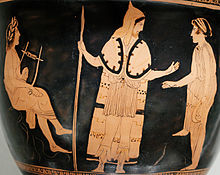
Back Orfeus Afrikaans أورفيوس Arabic اورفيوس ARZ Orfey Azerbaijani Арфей Byelorussian Арфэй BE-X-OLD Орфей Bulgarian ওর্ফেউস Bengali/Bangla Orfeüs Breton Orfej BS
| Orfeo | |
|---|---|
 | |
| Nome orig. | Ὀρφεύς |
| Caratteristiche immaginarie | |
| Specie | umana |
| Sesso | maschio |
| Luogo di nascita | Tracia |
| Professione | cantore e argonauta |


«Dicono poi che le donne di Tracia tramavano la sua morte, perché aveva persuaso i loro uomini a seguirlo nei suoi vagabondaggi, ma non osavano passare all'azione per paura dei loro mariti. Ma una volta, riempitesi di vino, attuarono la scellerata impresa. E da quel momento invalse per gli uomini il costume di andare ebbri alle battaglie.»
Orfeo (in greco antico: Ὀρφεύς Orphéus, pronuncia: [or.pʰeú̯s]; in latino: Orpheus, pronuncia: ['or.pʰeus]; ) è un personaggio della mitologia greca, fondatore e figura chiave dell'orfismo[4]. Si tratta dell'artista per eccellenza, che dell'arte incarna i valori eterni[5], ma anche di uno «sciamano, capace di incantare animali e di compiere il viaggio dell'anima lungo gli oscuri sentieri della morte»[6]. I molteplici temi chiamati in causa dal suo mito - l'amore, l'arte, l'elemento misterico - sono alla base di una fortuna senza pari nella tradizione letteraria, filosofica, musicale, culturale e scultorea dei secoli successivi.

- ^ Cristopher Riedweg, Orfeo, in Salvatore De Settis (a cura di), Storia Einaudi dei Greci e dei Romani, vol. 4, Milano-Torino, Il Sole 24 Ore - Einaudi, 2008, p. 1259, SBN IT\ICCU\TO0\1712319.
- ^ Pausania, Viaggio in Grecia, traduzione di Salvatore Rizzo, Milano, Rizzoli, 2011, p. 243, ISBN 978-88-17-04635-0.
- ^ Anche Conone, f. 45 (115 Frammenti orfici, nella edizione di Otto Kern).
- ^ «Orfeo, fondatore dell'Orfismo» è l'incipit della voce nell'Oxford Classical Dictionary (trad. it. Dizionario di antichità classiche, Cinisello Balsamo (Milano), San Paolo, 1995, p. 1521, ISBN 88-215-3024-8.), voce firmata da Nils Martin Persson Nilsson, Johan Harm Croon e Charles Martin Robertson. La voce dell'Oxford Classical Dictionary prosegue precisando: «La sua fama di cantore nella mitologia greca deriva dalle composizioni nelle quali erano esposte le dottrine e le leggende orfiche».
In modo analogo la Encyclopedia of Religion ( NY, Macmillan, 2005 [1987], pp. 6891 e sgg., ISBN 0-02-865733-0, SBN IT\ICCU\UMC\0030411. ) avvia la voce Orpheus a firma di Marcel Detienne (1987) e Alberto Bernabé (2005): «In the sixth century BCE, a religious movement that modern historians call Orphism appeared in Greece around the figure of Orpheus, the Thracian enchanter.».
Werner Jaeger evidenzia tuttavia che «nella tarda antichità Orfeo era un nome collettivo il quale più o meno raccoglieva tutto quanto esisteva in fatto di letteratura mistica e di orge liturgiche.» (Cfr. La teologia dei primi pensatori greci, traduzione di Ervino Pocar, Firenze, La Nuova Italia, 1982, p. 100, SBN IT\ICCU\UFI\0058276.). - ^ Marcel Detienne (1987) e Alberto Bernabé, Encyclopedia of Religion, vol. 10, NY, Macmillan, 2005, p. 6892, ISBN 0-02-865743-8.«Thus, before he becomes the founding hero of a new religion or even the founder of a way of life that will be named after him, Orpheus is a voice—a voice that is like no other. It begins before songs that recite and recount. It precedes the voice of the bards, the citharists who extol the great deeds of men or the privileges of the divine powers. It is a song that stands outside the closed circle of its hearers, a voice that precedes articulate speech. Around it, in abundance and joy, gather trees, rocks, birds, and fish. In this voice—before the song has become a theogony and at the same time an anthropogony—there is the great freedom to embrace all things without being lost in confusion, the freedom to accept each life and everything and to renounce a world inhabited by fragmentation and division. When representatives of the human race first appear in the presence of Orpheus, they wear faces that are of war and savagery yet seem to be pacified, faces that seem to have turned aside from their outward fury.»
- ^ Giulio Guidorizzi, Il mito greco, vol. 1, Milano, Mondadori, 2009, p. 77, ISBN 978-88-04-58347-9.